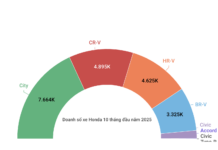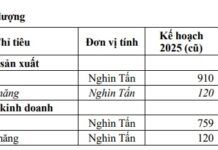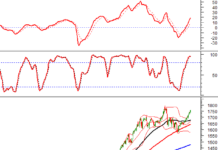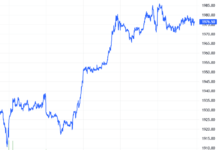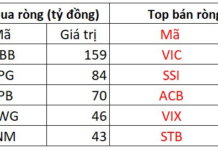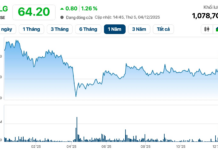Ho Chi Minh City’s Department of Industry and Trade reported that in 2023, the city recorded the highest e-commerce sales in the country, amounting to $6.2 billion, accounting for 29% of the national e-commerce market.
E-commerce sales (calculated based on warehouse locations) reached $4.7 billion, contributing 23% to the national e-commerce landscape, a growth of 37% compared to the previous year. The city’s e-commerce sector witnessed a remarkable increase in productivity, with a total output of 440 million products, reflecting a significant rise of 45.2% from the previous year.
While total e-commerce revenue exhibited a positive trajectory, there was an 18.5% decline in the number of online sellers. This indicates an increasingly competitive and dynamic market environment, where only the fittest survive.
During the Ho Chi Minh City People’s Council’s supervision session on the implementation of the 2024 theme: “Determination to Effectively Carry Out Digital Transformation and Resolution 98,” held on October 24, 2024, Mr. Bui Ta Hoang Vu, Director of the Department of Industry and Trade, highlighted the robust growth of e-commerce activities in the city. He emphasized that e-commerce has become an essential distribution channel, significantly contributing to efficient goods consumption.
Ho Chi Minh City’s e-commerce landscape is characterized by rapid expansion in both scale and quality, setting a solid foundation for even more sustainable development in the future, particularly with the enforcement of free trade agreements.
When it comes to the number of websites and applications owned by organizations and individuals residing in Ho Chi Minh City and registered with the Ministry of Industry and Trade, the city boasts the highest proportion in the country.
Specifically, Ho Chi Minh City is home to 23,870 e-commerce websites (accounting for 47.2% of the national total) and 319 websites offering e-commerce services (constituting 43.5% of the country’s total).
The e-commerce revenue for the first six months of 2024 accounted for 16.7% of the city’s total retail sales, showcasing the significant contribution of online commerce to the local economy.

However, alongside the positive developments, challenges persist in the realm of e-commerce growth. One pressing concern is the lack of regulations and technical barriers to effectively manage cross-border e-commerce activities.
Mr. Vu expressed his concern about the infiltration of Chinese companies establishing warehouses near the border, leveraging technology and solutions to facilitate the supply of goods. The department has officially reported this issue to the Ministry of Industry and Trade, requesting necessary interventions.
Additionally, the prevalence of counterfeit, pirated, and substandard goods on online platforms continues to cause harm to consumers. The inspection, detection, and enforcement against illegal activities in e-commerce remain limited, hindering proactive prevention and handling of counterfeit, prohibited, and intellectual property-infringing goods.
Addressing this issue, Dr. Tran Quang Thang, Director of the Ho Chi Minh City Institute of Economics and Management, pointed out that while the city dominates the national e-commerce landscape, the authority to grant permits lies with the Ministry of Industry and Trade. This centralization creates challenges in tax calculation, market regulation, and the adoption of more advanced technologies. Therefore, he suggested that the city propose a more reasonable mechanism to address this challenge.
Providing directives on digital transformation and e-commerce management in Ho Chi Minh City, Mr. Pham Thanh Kien, Vice Chairman of the Ho Chi Minh City People’s Council, emphasized the necessity of embracing digital transformation as a regular and focused endeavor. He underscored that digital transformation is inevitable and crucial for effective state management.
Mr. Kien asserted that relying solely on human resources for management is insufficient, advocating for the integration of digital transformation and artificial intelligence (AI) technologies. By leveraging AI, complex issues that were previously insurmountable can now be effectively addressed…
“Revolutionizing Logistics for the New Era”
Ranking 43rd in the Logistics Performance Index, within the top 5 ASEAN countries in 2023, Vietnam’s logistics industry is rapidly developing, thanks to its strategic geographical location and production capabilities. However, it’s not just about relying on existing potential and advantages; a transformative leap is necessary to thrive in this new era.
The Data Law: A Vital Enabler of the Digital Economy
In Vietnam’s accelerating digital transformation journey, the development and enactment of the Data Law is a crucial step towards establishing a robust legal framework for data governance and exploitation. The draft Data Law is currently under discussion, and if passed, it will have far-reaching implications for various sectors, especially national digital transformation, the digital economy, and digital society.
KienlongBank Successfully Holds 2024 Extraordinary General Meeting of Shareholders
On October 26, KienlongBank (UpCOM: KLB) successfully held its 2024 Extraordinary General Meeting of Shareholders (EGMS) in Hanoi, with a significant turnout of shareholders.
The Inefficiencies of Using Barcode Systems for Supply Chain Management
To enhance the effectiveness and efficiency of product quality management for businesses, it is essential to embrace the use of barcode technology and product traceability. By implementing this innovative approach, enterprises can significantly improve their processes and gain a competitive edge in the market.



